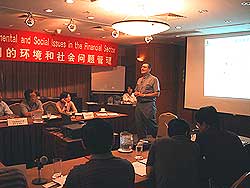 FI
Konsult works with the management of local financial institutions
to understand their existing transaction appraisal processes, including
the existing documentation and the roles of various staff in those
processes.
FI
Konsult works with the management of local financial institutions
to understand their existing transaction appraisal processes, including
the existing documentation and the roles of various staff in those
processes.
This interaction results in a needs analysis identifying the gaps between existing environmental risk management procedures in the institution and international best practices. We then recommend the least obtrusive approach to developing, integrating, and sustaining an environmental risk management culture and appropriate procedures into that existing transaction appraisal process.
 The
nature and extent of environmental risk management efforts and activities
should be directly related to the nature and extent of environmentally
derived risks associated with a particular business activity and
the transaction contemplated by the financial institution.
The
nature and extent of environmental risk management efforts and activities
should be directly related to the nature and extent of environmentally
derived risks associated with a particular business activity and
the transaction contemplated by the financial institution.
FI Konsult recommends simple actions that the local financial institution can adopt to integrate appropriate international best practices of environmental risk management into their existing transaction appraisal process.
Such procedures are structured to allow non-technical staff to (i) identify and appraise environmentally derived risks in order to make an informed decision regarding a proposed transaction, (ii) remove, reduce, and manage potentially significant risks, and (iii) monitor the risk profile during the term of a transaction.
 FI
Konsult provides training in the value and use of environmental
risk management in financial transactions. Training activities can
focus on training line staff or training trainers.
FI
Konsult provides training in the value and use of environmental
risk management in financial transactions. Training activities can
focus on training line staff or training trainers.
Training sessions are conducted in small (20–24 persons) interactive groups, where teams work on video based case studies and perform various role plays designed to provide hands on experience utilizing environmental risk management tools to identify, appraise, manage and monitor environmentally derived risks associated with the case studies.
FI Konsult specializes in identifying, analyzing and summarizing the local political, economic, legislative, and regulatory factors affecting the nature and extent of environmentally derived risks in each country.
For example, updated overviews of legislative and regulatory developments enable institution staff to evaluate and predict the likely environmental behaviour (e.g., compliance) of customers and/or partners.